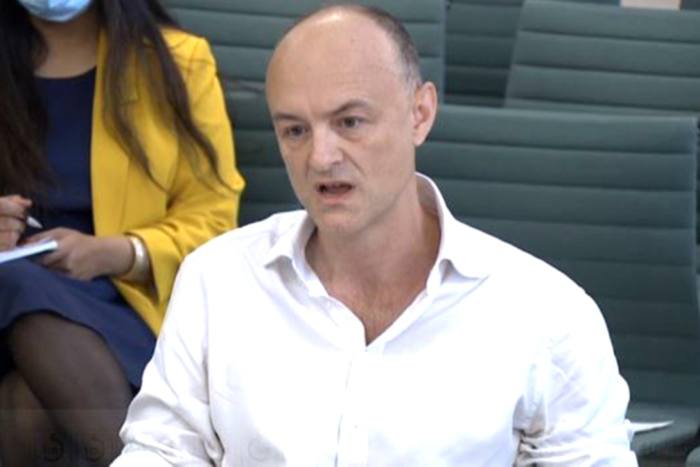By Ben Kerrigan-
The Prime Minister’s former chief aide, Dominic Cummings, has continued his attacks against Downing Street by claiming Boris Johnson thought he himself was unfit to become prime minister before he got the top post.
Mr Cummings used a blog post to claim that he knew that Mr Johnson was “unfit to be PM”, adding: “We also knew that he knew too, since he’d told us.”
In a Substack blog, Mr Cummings said the admission was made the day after the EU referendum and shortly after David Cameron quit as prime minister.
Cummings said he had taken the job in No 10 to “improve science, defence, Whitehall and more” – topics he had long ruminated on after his work in the civil service as a special adviser to Michael Gove.
Mr Cummings wrote: “On 24 June 2016 in Vote Leave HQ, just after Cameron had resigned, Boris pulled me into the odd little room where the ‘campaign within the campaign’ was run. What now?
“Boris told me with a laugh, ‘Obviously it’s ludicrous me being PM – but no more ludicrous than Dave (Cameron) or George don’t you think?’
“I agreed and reminded him of the main elements of the deal we’d agreed with (Michael) Gove about what to do next.”
Despite the perceived weaknesses of Mr. Johnson, he added, he and former members of the Vote Leave campaign decided to “roll the dice” and join his No 10 team anyway, believing his defects could be “partly mitigated” in office.
He added that they also believed that, without their help, the Conservatives would fail to resolve the post-referendum “constitutional crisis”.
This, he wrote, could have led to a second referendum and former Labour leader Jeremy Corbyn winning power, which would be “probably be an even bigger disaster”.
He also justified the move as a chance to deliver post-Brexit political reforms, adding they thought Mr Johnson’s weaknesses could be “turned to advantage”.
Mr Cummings left Downing Street in November last year following a power struggle with the Prime Minister’s then-fiancee, Carrie Symonds-now his wife.
Following weeks of criticism of Mr Johnson, Mr Cummings wrote that he had been questioned about why he took up the Downing Street role “if you knew Boris was so hopeless” and why he was involved in the 2019 general election.
Mr Cummings said that in spring 2019, he and his team had discussed the “pros and cons” of him becoming Prime Minister, writing that Mr Johnson’s time as foreign secretary was a “severe warning of the dangers ahead”. He said he decided to “roll the dice” and support efforts to get Mr Johnson into Number 10, over fears of former Labour leader Jeremy Corbyn becoming prime minister and the possibility of a second EU referendum.
Boris Johnson’s appointment as foreign secretary in July 2016 was considered a shocking move by Theresa May, mainly because he had been gunning for her position which he was favourite to gain until he was stabbed in the abck by Michael Gove, now the prime minister’s Foreign Secretary. The back stabbing came after the prime minister let down some of his colleagues who were expecting him to send a tweet confirming their inclusion in their cabinet in once they made their full backing for him as their leader official. Johnson’s delay to send the expected tweet aroused suspicions, and Theresa May was eventually the pick of the bunch, sending today’s prime minister into a depression.
Johnson’s appointment as Foreign Secretary was more a case of politics than anything else. Theresa May new she had been lucky to take his spot, so made him Foreign Secretary as part of a deal to keep the rest of the political crew sweet. The prime minister’s time as Foreign Secretary was characterized by gaffes. He compared the former French president, François Hollande, to an officer in a World War II prisoner of war camp.
He once joked that business was prevented from investing in Libya by the dead bodies, and recounted a colonial-era poem while visiting a Burmese temple, and once compared the former French president, François Hollande, to an officer in a World War II prisoner of war camp.
He also joked that business was prevented from investing in Libya by the dead bodies, and recounted a colonial-era poem while visiting a Burmese temple. His critics saw these weaknesses as a clear case that made him unfit for any serious political position, but those who find Johnson amusing tell me these traits or weanesses were just some of the eccentricities that made him interesting and different.
He added: “If we win the election then he tries to move us out of No 10, we can try to move him out of No 10 – two can play at that game – and we can use reshuffles to move some much more able people into position.”
Mr Johnson became Prime Minister in 2019 after winning the Conservative Party leadership race, following the resignation of Theresa May, and went on to secure a landslide win at the general election later that year.




